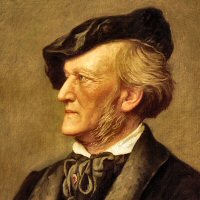|
Handout (flat)
Handout (folded)
Return to Index Synopsis (Lohengrin) Synopsis (Parsifal) |
Richard Wagner (1813–83) was a political animal, and all his operas are, on some level, political too. After
a brief survey of the production history of his later operas, we look at a couple of scenes from an earlier one,
Lohengrin (1850), written while the composer was actually taking part in a revolution. We then turn to
the particular challenge posed by his swanson opera Parsifal: namely, how can you take an esoteric,
reactionary opera marinated in Christian mysticism, and make it relevant to real-life concerns in the more secular
world we inhabit today?
 |
Richard Wagner, 1813–83. German composer. Wagner almost single-handedly transformed the nature not only of opera but also of harmony and orchestration. His 10 mature operas include Tristan und Isolde (1865), Die Meistersinger von Nürnberg (1868), and the vast tetralogy Der Ring des Nibelungen (completed 1876), for which he had a special theater built at Bayreuth. His final opera, Parsifal (1882), was written for exclusive performance at that theater. |
























